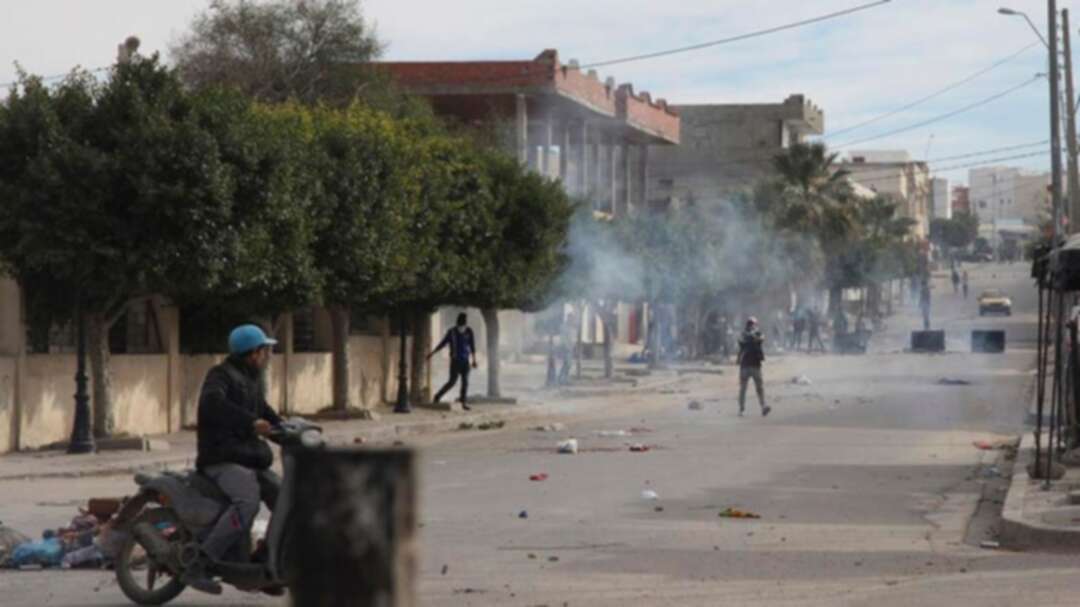-
Tunisia’s police and demonstrators clash in third night of protests

Clashes erupted on Monday between protesters and Tunisian police who fired tear gas to disperse them in the southern town of Jelma, the third consecutive night of protest against poverty and lack of opportunity, witnesses said.
Protests began on Saturday, a day after Abdelwaheb Hablani, 25, set himself on fire and died in hospital in protest at poverty and poor living conditions, echoing the 2010 self-immolation of Mohammed Bouazizi, whose death triggered the Arab Spring.
Habana had occasional work as a casual laborer in Jelma, located near Bouazizi’s home city of Sidi Bouzid in Tunisia’s deeply impoverished interior. He was buried on Saturday.
Witnesses told Reuter's security forces fired tear gas and were chasing youths protesting in the streets of Selma.
Protesters blocked roads and burned tires.
“The situation is difficult here. Police are flexing their muscles and they fired tear gas everywhere,” Bilel Harzali, a resident, told Reuters.
“The scene brings to mind the days of the revolution. ...People are angry because of the lack of development and the strong security response,” he added.
Mass protests that followed Bouazizi’s funeral in December 2010 toppled the veteran autocrat Zine El Abidine Ben Ali, who died in exile in Saudi Arabia in September, and introduced democracy in the North Africa country.
Since Bouazizi’s death in December 2010, numerous young men have followed his example by setting themselves alight in the face of Tunisia’s chronic economic difficulties.
The birthplace of the “Arab Spring,” Tunisia is the only country to achieve a peaceful transition to democracy following the 2011 popular revolts that swept autocrats from power across North Africa and the Middle East.
But since 2011, Tunisia’s economy has been in crisis and nine cabinets have failed to resolve economic problems, including high inflation, unemployment, and corruption.
source: Reuters
You May Also Like
Popular Posts
Caricature
BENEFIT Sponsors BuildHer...
- April 23, 2025
BENEFIT, the Kingdom’s innovator and leading company in Fintech and electronic financial transactions service, has sponsored the BuildHer CityHack 2025 Hackathon, a two-day event spearheaded by the College of Engineering and Technology at the Royal University for Women (RUW).
Aimed at secondary school students, the event brought together a distinguished group of academic professionals and technology experts to mentor and inspire young participants.
More than 100 high school students from across the Kingdom of Bahrain took part in the hackathon, which featured an intensive programme of training workshops and hands-on sessions. These activities were tailored to enhance participants’ critical thinking, collaborative problem-solving, and team-building capabilities, while also encouraging the development of practical and sustainable solutions to contemporary challenges using modern technological tools.
BENEFIT’s Chief Executive Mr. Abdulwahed AlJanahi, commented: “Our support for this educational hackathon reflects our long-term strategic vision to nurture the talents of emerging national youth and empower the next generation of accomplished female leaders in technology. By fostering creativity and innovation, we aim to contribute meaningfully to Bahrain’s comprehensive development goals and align with the aspirations outlined in the Kingdom’s Vision 2030—an ambition in which BENEFIT plays a central role.”
Professor Riyadh Yousif Hamzah, President of the Royal University for Women, commented: “This initiative reflects our commitment to advancing women in STEM fields. We're cultivating a generation of creative, solution-driven female leaders who will drive national development. Our partnership with BENEFIT exemplifies the powerful synergy between academia and private sector in supporting educational innovation.”
Hanan Abdulla Hasan, Senior Manager, PR & Communication at BENEFIT, said: “We are honoured to collaborate with RUW in supporting this remarkable technology-focused event. It highlights our commitment to social responsibility, and our ongoing efforts to enhance the digital and innovation capabilities of young Bahraini women and foster their ability to harness technological tools in the service of a smarter, more sustainable future.”
For his part, Dr. Humam ElAgha, Acting Dean of the College of Engineering and Technology at the University, said: “BuildHer CityHack 2025 embodies our hands-on approach to education. By tackling real-world problems through creative thinking and sustainable solutions, we're preparing women to thrive in the knowledge economy – a cornerstone of the University's vision.”
opinion
Report
ads
Newsletter
Subscribe to our mailing list to get the new updates!






















